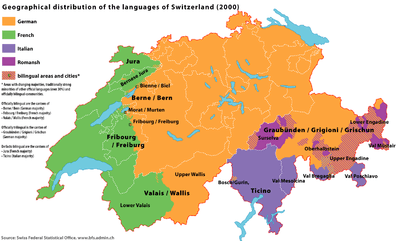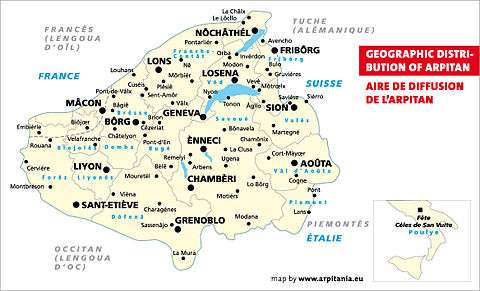Swiss French
Swiss French (French: français de Suisse) is the variety of French spoken in the French-speaking area of Switzerland known as Romandy. French is one of the four official languages of Switzerland, the others being German, Italian, and Romansch. As of 2015, around 2 million people in the country (24.4% of the population) spoke French as their primary language, and around 29.1% of the population has working knowledge of French.[1]


The French spoken in Switzerland is very similar to that of France or Belgium due to historical French policy of education in Francien French only in schools after the French Revolution. It has only minor, mostly lexical, dialectal differences influenced by its local substrate languages. This contrasts with the differences between Standard German and Swiss German, which are largely mutually unintelligible.
Swiss French is characterized by some terms adopted from the Arpitan language, which was formerly spoken widely across the alpine communities of Romandy but only by a few today. Also, expressions have been borrowed from both Swiss and Standard German. Although Standard French is taught in schools and used in the government, the media and business, there is no uniform vernacular form of French among the different cantons of Switzerland. For example, some German terms in regions bordering German-speaking communities are completely unused in the area around Geneva near the border with France.[2]
Phonology
|
| ||||||||||||||||||||||||||||||||||||||||
- The nasal vowels are pronounced like in France. /ɑ̃/ → [ɒ̃], /ɛ̃/ → [æ̃], /ɔ̃/ → [õ]. Conversely, the nasal vowels /ɛ̃/ and /œ̃/ are kept separate in much Swiss French speech, where much speech in France has merged them. For example, brin (stalk) and brun (brown) are still pronounced differently, like in Quebec and Belgium, unlike in Paris.[3]
- As in Belgium, the distinction between the vowels /ɛ/ and /ɛː/ is maintained in Switzerland, but they have merged in France. For example, mettre (put) and maître (master) are still pronounced differently, unlike in France.
- The distinction between mid vowels /o/ and /ɔ/ has also been maintained in final open syllables, as well as that between /e/ and /ɛ/. For example, peau (skin) and pot (jar) are still pronounced differently, unlike in France and Quebec. For that reason, entré (entered; past participle of entrer) and entrait (third-person singular of the verb entrer in the imperfect indicative) are differentiated, where Français de référence tends to merge them.[3]
- There is a stronger distinction between long and short vowels in Switzerland:
- Long vowels are allowed in closed syllables, even at the end of a word: ⟨ée⟩, ⟨aie⟩ [eː], ⟨ue⟩ [yː], ⟨ie⟩ [iː], ⟨oue⟩ [uː] and ⟨eue⟩ [øː]. As a result, almost all feminine adjectives are still phonetically distinct from their masculine counterparts, unlike in France and Quebec.[3]
- Speakers are also wont to differentiate masculine from feminine adjectives phonetically, including in final closed syllables, although the spelling only partially bears out this occurrence, e.g. mental is pronounced /mɑ̃.tal/, whilst the feminine mentale is pronounced /mɑ̃.tɑːl/. Other minimal pairs are similarly differentiated, like amen and amène (third-person singular in the present indicative of amener, to lead).[3]
- The marginal phoneme /ɑ/ is usually pronounced [ɑː], meaning pattes (paws) and pâtes (pasta) are differentiated. Similar to the process described above, the circumflex also affects vowel length when used above a vowel, meaning ⟨î⟩ is pronounced [iː], ⟨ê⟩ as [ɛː], ⟨û⟩ as [yː], ⟨oû⟩ as [uː] and ⟨eû⟩ [øː].[3]
Differences from French of France
Many differences between Swiss French and the French of France are due to the different administrative and political systems between Switzerland and France. Some of the distinctive lexical features are shared with Belgian French (and some also with Quebec French):
- The use of the word septante for seventy and nonante for ninety as opposed to soixante-dix (literally 'sixty-ten') and quatre-vingt-dix (literally 'four twenties-ten') of the "vigesimal" French counting system.
- The use of the word déjeuner for "breakfast" ("lunch" in France, which uses petit déjeuner for "breakfast"), and of the words le dîner and le souper for "lunch" and "dinner" respectively (in French of France, déjeuner and dîner respectively), much like the varying uses of dinner and supper throughout the English-speaking world.
Other examples which are not shared with other varieties of French:
- The word huitante is sometimes used for eighty instead of quatre-vingts (literally 'four twenties'), especially in the cantons of Vaud, Valais and Fribourg; the term octante (from the Latin octaginta) is now considered defunct.
- The word canton has a different meaning in each country; in Switzerland, a canton is a constituent state of the Confederation, but in France, it is a grouping of communes. In Belgium, it is a group of municipalities, but in Quebec, it is a township municipality.
- In France, a post office box is called a boite postale (BP),[4] but in Switzerland (as in French Canada), it is called a case postale (CP).[5]
- In colloquial Swiss French, the word natel is used for "mobile phone": "I didn't take my phone" becomes Je n'ai pas pris mon natel. France uses either portable or téléphone.
Examples of words that differ between Switzerland and France
| Swiss French | Standard French | English | Notes |
|---|---|---|---|
| action | promotion | special offer | Germanism, from "Aktion" ("promotional campaign"). |
| adieu | salut | hello/goodbye | In French, "adieu" means "farewell" and is generally never used except in cases where the people concerned will not meet again. In Switzerland it is used as an informal general form of greeting when people meet or leave each other. |
| attique | dernier étage | top floor | |
| bancomat | Distributeur automatique de billets | ATM | |
| bobet | crétin (noun) or bête/stupide (adjective) | idiot (noun) or stupid (adjective) | |
| boguet | mobylette | moped | |
| bonnard | sympa or bien | nice | |
| bonne-main | pourboire | tip (gratuity) | Literally "good-hand". |
| borne hydrante | bouche d'incendie | fire hydrant | |
| bourbine | suisse-allemand | Swiss-German | This word is considered pejorative. |
| carnotzet | cave à vin/cellier/fumoir | Wine cellar | This expression can sometimes be found in France, in places close to Switzerland. |
| chenis | désordre | mess | |
| chiquelette | chewing-gum | chewing-gum | |
| collège (Genève, Valais, Fribourg) or gymnase (Vaud) | lycée | high school | |
| crousille | tirelire | piggy bank | |
| cornet | sac en plastique | plastic bag | In France, "cornet" would typically designate an ice cream cone. |
| cutips | coton-tige | cotton bud/swab | Antonomasia from the brand Q-tips which phonetically becomes "cutips" when pronounced in French. |
| cycle (Genève, Fribourg, Valais) | collège | middle school | |
| déjeuner | petit-déjeuner | breakfast | Meal names are shifted in Swiss French, meaning that the name for lunch is used for breakfast, the one for dinner is used for lunch and the French equivalent of the word "supper" is used for dinner. |
| dîner | déjeuner | lunch | Meal names are shifted in Swiss French, meaning that the name for lunch is used for breakfast, the one for dinner is used for lunch and the French equivalent of the word "supper" is used for dinner. |
| duvet | couette | comforter / duvet | "Duvet" comes from the fact that comforters used to be filled with down feather (duvet). "Duvet" in France means sleeping bag, for similar reasons. |
| s'encoubler | se prendre les pieds dans quelque chose/trébucher | to trip over | |
| s'énuquer | se briser la nuque | to break a neck | |
| étude d'avocats | cabinet d'avocats | law firm | |
| fœhn | sèche-cheveux | hairdryer | The name "fœhn" comes from the Foehn wind. |
| fonds | terrain or champs | field | |
| fourre | dossier/housse | folder | In French, "fourrer" means "to stuff". |
| frouz | les Français | people from France - French | This word is considered pejorative. |
| galetas | grenier | attic | Also used in Alpine regions of France, down to Dauphiné. |
| giratoire | rond-point, giratoire | roundabout | Comes from "carrefour à sens giratoire" which would translate to "circular crossroads". |
| gouille | flaque | puddle | |
| huitante | quatre-vingts | eighty | In Swiss French, as opposed to French, the words for seventy, eighty and ninety are similar in construction to the ones used for thirty up to sixty. |
| linge | serviette | towel | In French, "linge" is a generic word that refers to clothing, bed sheets and towels. |
| lolette | tétine | pacifier/teat | |
| maman de jour | assistante maternelle | day care assistant | |
| mascogner | tricher aux examens | cheat during exams | |
| maturité | baccalauréat | high-school final examination | |
| mutr | mère | mother | Comes from the German word for "Mother", "Mutter". |
| natel | (téléphone) portable | mobile phone | |
| nom de bleu ! | nom de dieu ! | in the name of god!/god dammit! | |
| nonante | quatre-vingts-dix | ninety | In Swiss French, as opposed to French, the words for seventy, eighty and ninety are similar in construction to the ones used for thirty up to sixty. |
| panosse | serpillière | floorcloth or mop | |
| papier ménage | papier essuie-tout | paper towel | |
| pive | pomme de pin | conifer cone | |
| poutzer | nettoyer | to clean | Comes from the German word "putzen" which means "to clean". |
| Procès verbal d'examen (PV) | bulletin de note | report card | |
| réclame | publicité | advertisement | "Réclame" is an older disused word for advertising in French. |
| régie | agence immobilière | real estate agent | |
| roye | pluie | rain | |
| royer | pleuvoir | to rain | |
| sans autre | sans plus attendre | without delay | |
| santé | à tes/vos souhaits | bless you (when someone sneezes) | |
| septante | soixante-dix | seventy | In Swiss French, as opposed to French, the words for seventy, eighty and ninety are similar in construction to the ones used for thirty up to sixty. |
| service | je t'en/vous en prie | you're welcome | From "à votre service" meaning "at your service". |
| services | couverts | cutlery | |
| signofile/indicateur | clignotant | indicator/turn signal (motor vehicle) | |
| souper | dîner | dinner | Meal names are shifted in Swiss French, meaning that the name for lunch is used for breakfast, the one for dinner is used for lunch and the French equivalent of the word "supper" is used for dinner. |
| tablard | étagère | shelf | |
| uni (short for université) | fac (short word for faculté) | university | |
| votation | scrutin | voting | |
| vatr | père | father | Comes from the German word for "Father", "Vater". |
See also
- Demographics of Switzerland
- Linguistic geography of Switzerland
- Swiss German
- Swiss Italian
Notes and references
- "Swiss census, 2012". Archived from the original on October 30, 2007.
- "L'aire de diffusion de l'arpitan, en France, en Italie et en Suisse". NotreHistoire.ch (in French). Archived from the original on 2013-07-23.
- Knecht, Pierre (2004). Dictionnaire suisse romand (in French). Éditions Zoé. ISBN 9782881825088.
- "Ouvrir une boite postale". La Poste (in French).
- "Case postale". Swiss Post (in French).